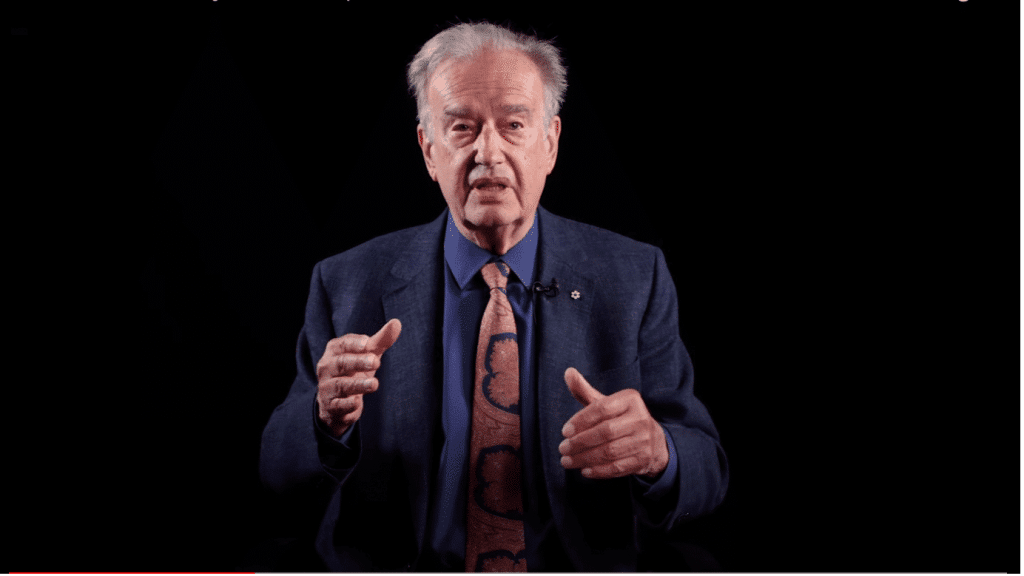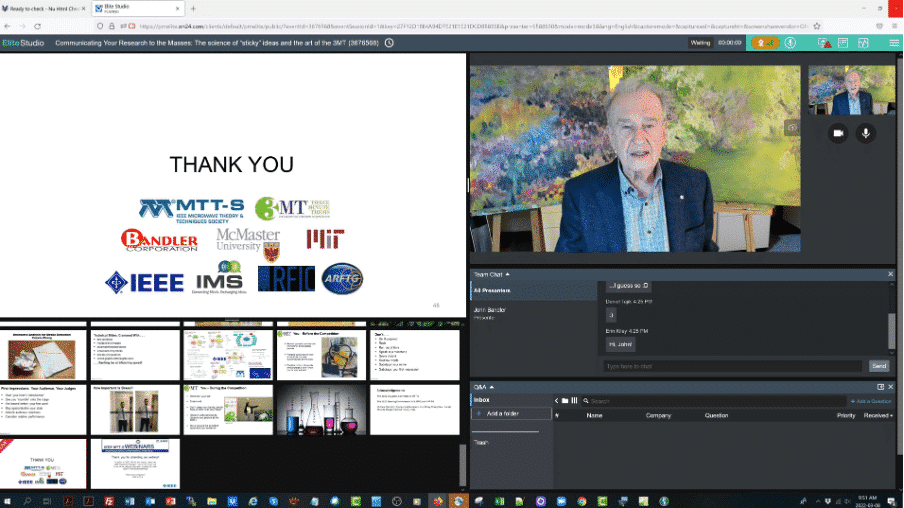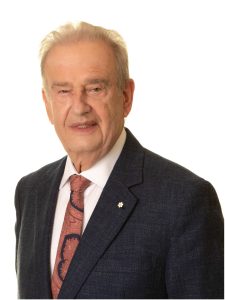22:49 BST
It is with the deepest sadness that I must report to you the passing of Dr. John Bandler. Dr. Bandler (Life Fellow, IEEE), passed away peacefully on September 28, 2023. He is survived by his wife, Beth Budd Bandler, and two children, Lydia Bandler Martin and Zoe Bandler Belvedere. The pioneer of the Space Mapping optimization technique, Dr. Bandler was an IEEE Life Fellow, the recipient of the 2023 IEEE Electromagnetic Award, the 2013 IEEE MTT-S Microwave Career Award, and the 2004 IEEE MTT-S Microwave Application Award. His loss is a tremendous one for MTT-S and our profession.
Information on funeral services can be found here: https://uhmc.ca/bandler-john-
Our thoughts and prayers are with Dr. Bandler and his family.
Nuno Borges Carvalho
2023 IEEE MTT-S President
John William Bandler — 1941 to 2023
Dr. John Bandler, O.C. (S’66-M’66-SM’74-F’78-LF’06, PhD, DSc(Eng), ACGI, DIC, FRSC, FCAE, LFIEEE, FEIC, PEng), an engineer, professor, entrepreneur, innovator, researcher, artist and speaker, as well as a loving husband, father, grandfather, friend and mentor, passed away on September 28, 2023. He is survived by his wife Beth Budd Bandler, his daughters Lydia Bandler Martin and Zoe Bandler Belvedere, and his grandchildren Eric, Matthew, Una, Sam, and Colin. He is shown in a 2023 photo.
John William Bandler was born on November 09, 1941 in Jerusalem during World War II, the only child of Max Bandler and Albine (“Billy”) Juliane (Früwirth) Bandler, refugees from Vienna, Austria.
At home everywhere he went, Dr. Bandler moved with his parents to Nicosia, Cyprus at a young age, attending the Junior School [4] and the English School in Nicosia [10]. He maintained fond recollections of childhood travels around Europe with his mother, who died in 1970, recalling “[we] swam regularly at the pristine and often deserted beaches of Cyprus of the 1940s and 50s. We cycled together, hiked together in the high [Kyrenia and] Troodos Mountains. Every spring, we trekked through field after field of wild anemones, tulips and orchids. She taught me chess and encouraged my piano” [5]. Decades later, Dr. Bandler would encourage his grandchildren’s pursuits of chess and piano [6,7], and would continue traveling the world with his wife Beth, snorkeling together with tropical fish in the Galapagos [8] and walking on ice sheets alongside penguins in Antarctica [9].
Dr. Bandler completed his schooling and university at the Imperial College of Science and Technology at the University of London, where he received his B.Sc.(Eng.), Ph.D., and D.Sc.(Eng.) degrees in 1963, 1967, and 1976, respectively. Having spent a brief period working at the Mullard Research Laboratories in Redhill, Surrey, England [10], Dr. Bandler then moved to Winnipeg, Manitoba, Canada for a postdoctoral fellowship at the University of Manitoba from 1967 to 1969. This postdoctoral fellowship reunited Dr. Bandler with his Imperial College friend and colleague, the late Alvin (“Al”) Wexler, then a professor at the University of Manitoba; Dr. Bandler characterized this connection and this period of his working life as “formative… where a significant part of my journey towards electromagnetic optimization began” [11].
On July 1, 1969, Dr. Bandler joined the engineering faculty at McMaster University, where he was promoted to full professor in 1974, and served as chair of the Department of Electrical Engineering from 1978 to 1979 and as Dean of the Faculty of Engineering from 1979 to 1981 [2]. It was at McMaster that Dr. Bandler coordinated the Group on Simulation, Optimization and Control from 1973 until 1983, when he formed the Simulation Optimization Systems Research Laboratory [8]. In 1983, while teaching and running his lab, Dr. Bandler founded the company Optimization Systems Associates, Inc. (OSA), which commercialized Dr. Bandler’s optimization algorithms and was sold to Hewlett-Packard (HP) in 1997. OSA’s technology became a part of HP’s EEsof division [12], later becoming Agilent Technologies and then being spun off into Keysight Technologies [13]. About OSA, Dr. Bandler recalled, “The OSA era 1983–1997 was made possible by clients who trusted us, and by a team of demonstrated talent and huge integrity, a team that loved their work as much as their teammates, a team for whose members nothing was too humble to attend to or fix, and where no one was shamed or excluded from the kudos, where occasional failings were fully forgiven and every success shared by all. A golden era, with associations and friendships forged for life” [14].
Dr. Bandler would author more than 500 papers in the field of optimization technologies for engineering modeling and design, pioneering and successfully implementing and scaling the technique of space mapping for optimizing devices, circuits, and systems in the radio-frequency, wireless, and microwave arenas [1,2]. He would also mentor and advise hundreds of students across several generations, even having supervised a Ph.D. student whose M.Sc. advisor had also completed his Ph.D. under Dr. Bandler [15].
About his work in optimization and the development of space mapping, Dr. Bandler recalled, “I’d already struggled [since 1963] to understand the so-called engineer’s ‘feel’ for a problem. Agonizing over why a relatively straightforward electromagnetics-based design problem took so long to optimize, I discovered that this ‘feel’—something we all have about lots of activities that are ‘second nature’ to us after years of practice—is not quite as mysterious as claimed by expert practitioners” [16]. A history of space mapping, as well as technical descriptions of the technique, can be found in [17,18]. Dr. Bandler recently offered the following summary of his distinguished career: “Exciting. Inspiring. Challenging. Satisfying. Benchmarked by amazing colleagues and champions. I constantly found myself swimming against the current” [19].
Dr. Bandler was a fellow of the Royal Society of Canada and the Canadian Academy of Engineering, as well as an IEEE Life Fellow. Among the many awards he received for his work are the 2004 IEEE MTT-S Microwave Application Award; the 2013 IEEE MTT-S Microwave Career Award; the 2012 IEEE Canada McNaughton Gold Medal [20]. In 2012, he received the Queen Elizabeth II Diamond Jubilee Medal, and in 2017, he was invested as an Officer of the Order of Canada “for his scientific contributions that have helped to position Canada at the forefront of microwave engineering” [21]. In 2018, Professional Engineers Ontario and the Ontario Society of Professional Engineers honored Dr. Bandler with their Ontario Professional Engineers Awards Gold Medal [2].
Most recently, Dr. Bandler received the 2023 IEEE Electromagnetics Award for outstanding contributions to electromagnetics in theory, application, or education, with the following citation: “For contributions to electromagnetic optimization and the modeling of high-frequency structures, circuits, and devices” [22].
An individual of diverse talents, Dr. Bandler also enjoyed numerous artistic activities, including painting, writing, film-making, and theatrical endeavors. Referring to his mother-in-law, Sybil Cohos, Dr. Bandler recalled, “Sybil introduced me to art, which developed into an interest in art history, which—combined with my decades-long leaning towards opera—still informs my creative writing” [23]. His fiction writing includes short stories, a novel, a screenplay, and nine stage plays [24,25].
In 2015, as well as continuing to conduct and publish his research, Dr. Bandler turned his attention to coaching and mentoring graduate students and young professionals across all disciplines in various types of public speaking, generously sharing his artistic talents and gift for clear communication and ethics with the hundreds of students he mentored through various competitions. Though he had long advised students and young professionals in issues related to communication and ethics, in this phase of his career, Dr. Bandler intentionally broadened the scope and reach of his mentorship. In 2016, he spearheaded and co-organized the inaugural Three Minute Thesis (3MT®) Competition for the 2017 IEEE MTT-S International Microwave Symposium (IMS), open to students and young professionals, with a training component that helped competitors describe their research without resorting to jargon or acronyms, with the goal of being understandable, meaningful, and memorable to a non-engineering audience. In the seven years that followed, Dr. Bandler continued co-organizing 3MT® Competitions at Microwave Week, now under MTT-S, also initiating 3MT® competitions at McMaster University and for his department [3]. Through these programs, Dr. Bandler’s guidance, insights and encouragement helped hundreds of young people, who now gesticulate more openly, think more lucidly, and say what they mean.
Dr. Bandler’s illustrious career spanned seven decades and produced remarkable contributions to science, engineering, and the arts, garnering him honors and awards among the most prestigious the MTT-S, the IEEE, and Canada can bestow. His mentorship touched several younger generations of electrical engineers: his own students, to whom he was tirelessly dedicated, but also the hundreds who received his coaching and advice during the 3MT® and other speaking and ethics workshops, programs, and events. The MTT-S extends its deepest sympathies to Dr. Bandler’s family, as well as to his numerous close friends and colleagues, on this profound loss.

Fig 1. John Bandler in his video-recorded acceptance speech for the IEEE Electromagnetics Award, presented at IMS 2023 in San Diego and available at [25]; screenshot taken October 2023.

Fig 2. John Bandler, upper right, in front of works he painted, preparing to deliver the 2022 MTT-S Webinar “Communicating your Research to the Masses”; screenshot taken March 2022.
References
—————————
For more information about the life of Dr. John William Bandler, please see especially [1,2,15,16,17,18].
